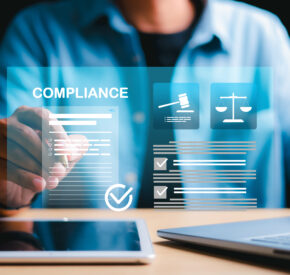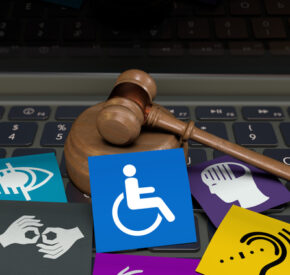Clearer Standards May Lead to a Culture Change
Legal expert Michael Zullo helps make sense of the new DOJ standards

While technology continues to evolve quickly, people with disabilities still face systemic barriers to accessing the digital world. Even as tech companies invest billions of dollars in artificial intelligence, many fail to ensure baseline accessibility standards for their products.
What’s holding our industry back? According to Michael Zullo, who’s spent over 20 years providing accessibility-focused legal guidance to financial institutions at Duane Morris LLP, a “lack of clear rules” is a major barrier. Mr. Zullo is deaf and serves on the board of the American Association of People with Disabilities, and has a deep personal stake in digital accessibility. He has empathy for disabled people who are trying to navigate this challenging landscape and companies that are trying to make sense of their specific responsibilities.
“Because there’s no strict guideline here, it’s really left to the company to decide how accessible it wants to be and what kind of company it wants to be with respect to its consumers who may have disabilities. And living in the world we live in, it was kind of astonishing to me that you could have this whole demographic shut out from interacting in the economy, from interacting with corporations.”
Zullo says the litigation has “largely remained the same” in recent years, with firms filing lawsuits alleging websites or portions thereof are inaccessible. These suits are typically focused on getting a settlement and raising the site up to a certain WCAG standard. They “capitalize on the ambiguity in what’s actually required.”
He believes that the new Department of Justice rule requiring state and local municipalities to meet WCAG 2.1 AA standards with their web content is “a big step in the right direction” but worries that “by the time they [governments] get ready, technology will have passed them by.” Zullo wants to see the DOJ update its 2010 rules, which serve as revisions to Titles II and III of the ADA, because these would serve as “rules of the road” for digital accessibility for the industry.
But beyond clearer regulations, Zullo believes our industry will only shift with a broader culture change. His view is that this starts with DEI, or DEIA. “We live in a world now where there are a lot of open, healthy discussions about DEI. I still think we have a long way to go to make disability a bigger part of that discussion. People often overlook disability when they’re talking about DEI. The downside is that disability issues are not getting the attention or corporate focus that they should be… Some companies have been better about getting out in front of accessibility, and trying to really push to have the most accessible workplace and website. And other companies it’s just not quite part of their corporate culture, so they’re working on it if or when they need to. It’s not because there’s a mandate or overwhelming public pressure.”
It’s particularly noteworthy that accessibility is often left out of the DEI conversation when we consider the number of Americans impacted by it, notes Zullo. Approximately 27% of adults in the United States have some kind of disability, and 29% of American adults provide care to an aging family member or friend. “I’d like to see disability become more a part of the mainstream conversation,” says Zullo. “We need to talk about it more to make it part of the everyday fabric of what we’re doing. If we’re in retail, we’re doing accessibility because we have a segment of our consumers that’s not zero that can’t access our platform and shop for our products. It’s a good business move.” Like many advocates, Zullo believes this work needs to start in the design and planning stages for digital products, rather than taking a remediation approach.
To push for change, Zullo believes that consumers with and without disabilities can work together. While the disability community isn’t monolithic, “web accessibility is something that affects the entire community of disabled people so it’s a good topic for engagement.” Zullo believes that consumers can push for a broader “cultural shift. The bigger a part of our culture it becomes, the more we expect accessibility, companies will respond. Not because of legal requirements or lawsuits, but because they want to be associated with doing the right thing.”





